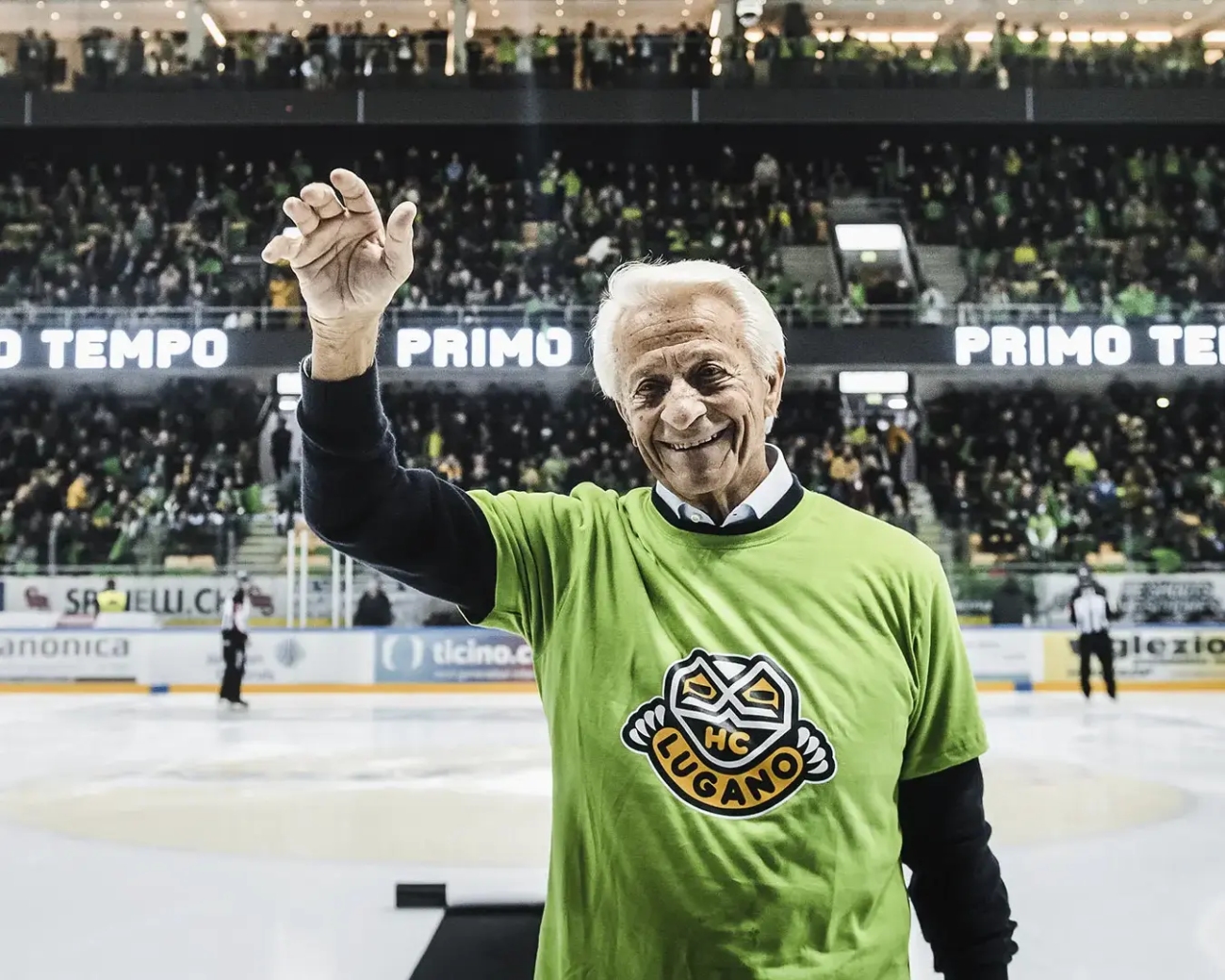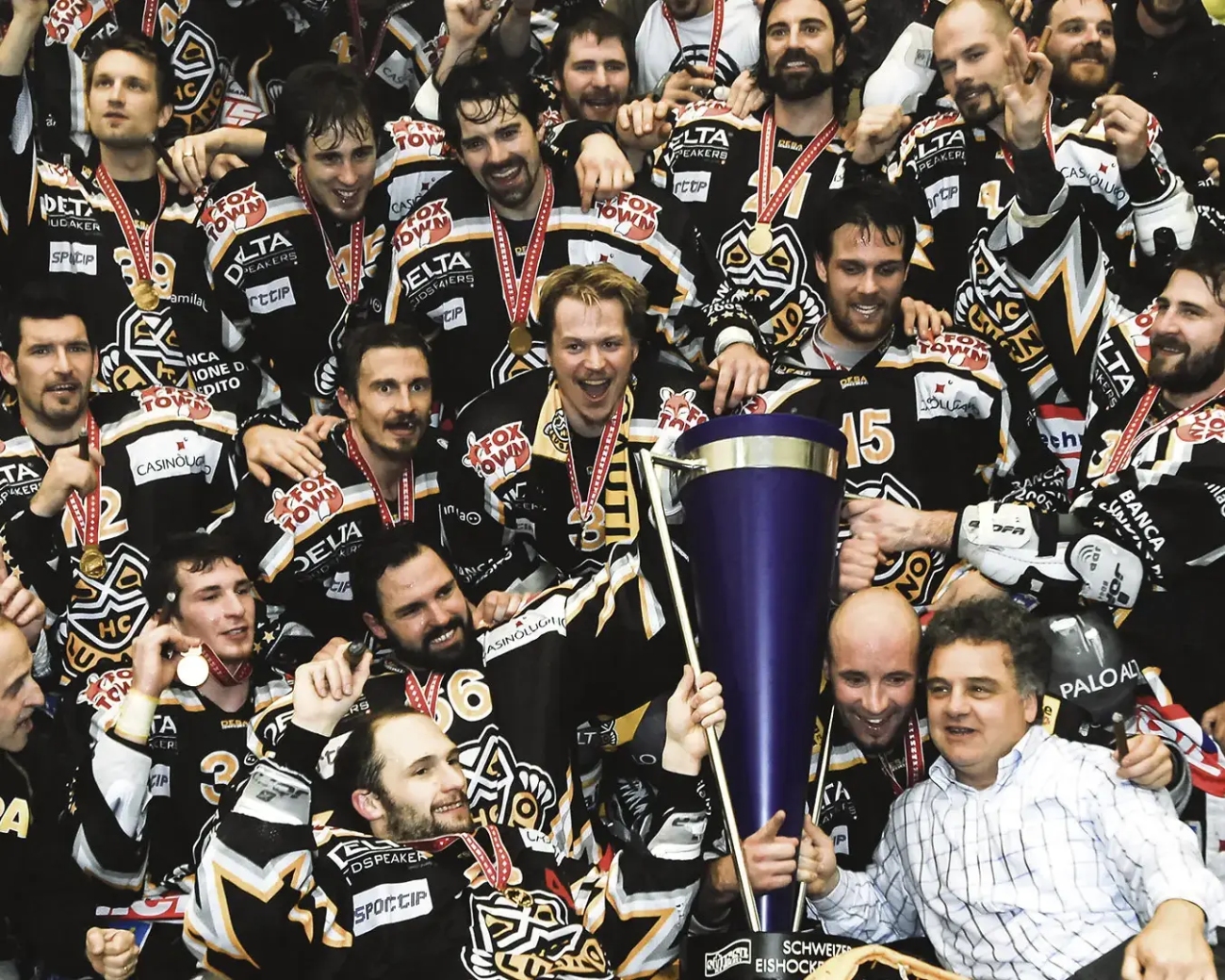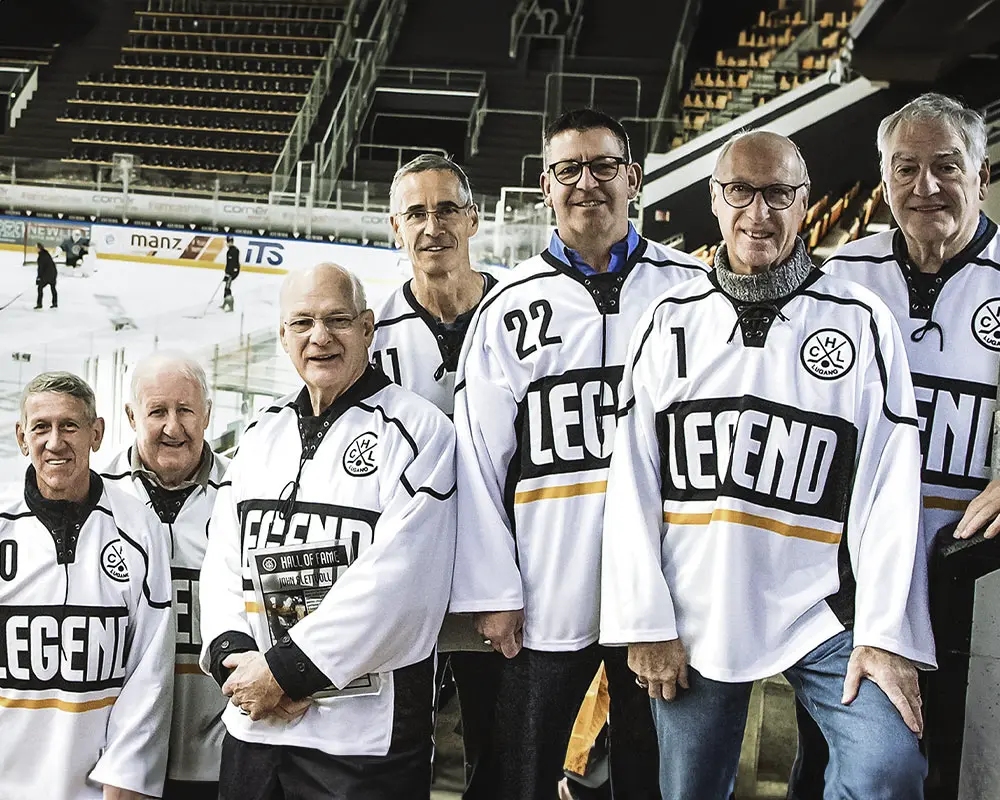-
Venerdì 02.01.2026 - h 19:45
-
Vota il best player
-
Acquista biglietti
-
Shop
-
Teams
-
Club
- Fans
-
Sponsor
-


 Vota il best player
Vota il best player
 Acquista biglietti
Acquista biglietti
 Shop
Shop
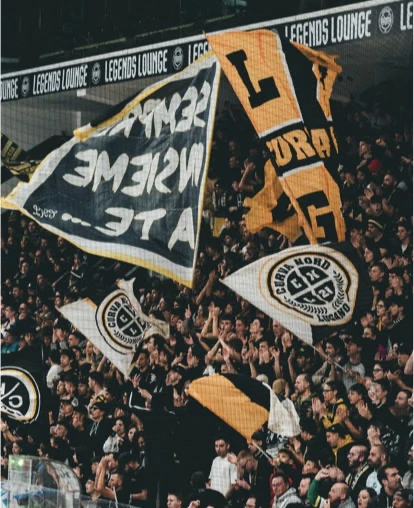
Relive the history of Hockey Club Lugano from 1941 to today, through promotions and the victory of seven National League titles.
Hockey Club Lugano was officially established on February 11, 1941, during World War II, at a meeting held in the small room of the Apollo Restaurant on Via Stauffacher, opposite the Kursaal. The founding members were Antonio Caslani, the Arrigo brothers, Ivo Badaracco, Bruno Soldini, Dino Bernardoni, Ivo Molina, Renato Crivelli, Guido Keller, Tullio Visani, Pepi Paulon, Livio Balmelli, Renato Paganetti, Kurt Tritten, Ezio Bernasconi, Federico Trachsler, and Alfonso Weber. The latter was designated as the first President, being a player of FC Lugano and able to provide the jerseys. Seven years after its founding, HCL left the pond in Muzzano to move to the Loreto neighborhood, gradually bringing hockey closer to the city's districts.
In Loreto, the first real matches took place with exhibitions from prestigious teams such as the Oxford University team. On February 1, 1950, in front of 2,500 people, a historic match was played: the Canadians from the Edmonton area, the Waterloo Mercurys, faced off against the Diavoli of Milan. A few weeks later, in London, those Canadians became world champions with the maple leaf. However, the lack of political support from city authorities led to eviction from Loreto as well. In 1955, after many hardships, Lugano played some matches on what was a tennis court in the summer at the Münger pastry shop in Paradiso, thanks to Cuccio Viglezio and Guido Keller, great supporters of the bianconeri family.
Also in 1955, a garage owner from Noranco named Albino Mangili set up the Noranco facility, where the first real signing in bianconeri history, Beat Rüedi from Graubünden, who had already played for the Swiss national team and won multiple Swiss championships with Davos, arrived. Rüedi skillfully moved across the field to realize what was considered a true dream in Lugano: an artificial ice rink.
Read moreOn February 29, 1964, at the Rapperswil rink, HCL finally achieved the long-awaited promotion to the LNB thanks to a remarkable recruitment campaign with the signing of Elwin Friedrich and Roland Bernasconi, both national players and Swiss champions with Villars. Among the heroes of that match was a great fifteen-year-old talent who would make history in Lugano: Alfio Molina.
There was also great shock for the supporters of Ambrì when Lugano surpassed their rivals in the Swiss Cup: the game was decided in overtime with a goal by Moretti.
Lugano spent nine years in the second division, with fluctuating results, although several players in the seventies ignited the Resega, such as the Finns Juha Pekka Rantasila and Henry Leppä and the American Tom Vanelli. In 1975, the bianconeri packed their bags and moved to the first covered rink in Lugano: the one in Mezzovico. The bianconeri played there for two seasons before the Palasport in Mezzovico collapsed on the morning of February 12, 1978, due to an exceptional snowfall. This event marked the club's return to the Resega, now permanently covered.
In 1978, a person who would become a significant figure in the history of Lugano and Swiss hockey entered the scene: Geo Mantegazza. Along with him came what would often be the seventh player on the ice: the Curva Nord! The new management team, consisting of Geo Mantegazza, Severo Antonini, and Fausto Senni, immediately achieved two historic results: for the first time, Lugano ranked ahead of Ambrì, and for the first time, on October 23, 1979, Valascia was conquered (5-2).
Read moreIn the first season in Serie A, besides the spectacular Canadian defenseman Bob Hess, Lugano welcomed the prolific forward Giovanni Conte and the great promise of Swiss hockey, the Appenzeller Jörg Eberle. In the summer of 1983, to shake things up, President Mantegazza initiated a real technical revolution by bringing in a new coach from Sweden: John Slettvoll. Alongside him, strict on and off the ice, came a player destined to become a fan favorite at the Resega: the legendary Kent Johansson! The agile number 25 had some initial adjustment problems but started to shine after Christmas!
Enthusiasm for hockey in Lugano grew, and other important players completed an increasingly competitive roster, such as national players Beat Kaufmann and Arnold Lörtscher. To tackle the 1984/85 season, Slettvoll's Lugano further strengthened with two crucial additions: Mats Waltin and Fredy Lüthi. Waltin was a true pillar of the Swedish national team and, along with Ingemar Stenmark and Björn Borg, a Swedish sports legend. The mighty bianconeri chased the champions of Davos throughout the season but could not wrest the title from the Grisons, nevertheless concluding the best season in their history up to that point with a second-place finish.
Read moreSaturday, March 1, 1986: Lugano is Swiss champion! A season to remember culminates with the most coveted prize: the delivery of the first Swiss playoffs cup to captain Kaufmann on the beautiful Davos rink. The hero of the evening and the entire championship is once again Kenta Johansson, with four goals in the decisive game that turn the score from 2-4 to 7-5! The Davos rink is tinged with bianconeri with more than 3,000 fans following the team. That evening marks the beginning of the Great Lugano era.
The 1986/1987 championship propels Lugano into Europe. Victorious first in East Berlin, the bianconeri eliminate what was considered the strongest Western team: Cologne. No Swiss team had ever reached the final stage of the European Cup. In the championship, Lugano repeats its success, winning its second national title in the playoffs against Kloten.
In the 1987/1988 season, despite Slettvoll having to rebuild the team, Lugano confirms its dominance in the championship. After dominating the regular season, they clinch their third consecutive title in the playoffs, again at Kloten's expense. The bianconeri win the final in three games, clinching the last match at the Resega with a goal by Vrabec in overtime under a delirious Curva Nord. A notable mention also goes to the European Cup held at an enthusiastic Resega. The honored guests included the legendary CSKA Moscow, then a world leader with legends like Larionov, Makarov, Krutov, and Fetisov, Färjestad, and Kosice. However, Lugano could do nothing against these giants of European hockey.
Read moreThe five-year period from 1990 to 1995 brought fewer joys to the bianconeri fans, with opponents increasing their investments in a now fully professional hockey world across Switzerland. The 1990-1991 season ended with a second-place finish in the regular season and a playoff final loss to Bern in four games. Nevertheless, Lugano spiced up the year with another participation in the final round of the European Cup in Düsseldorf, where they nearly pulled off an upset against the Finnish champions from Turku.
After the disappointing 1991-1992 season, the relationship between the club and the wizard Slettvoll entered a crisis. A troubled season ended with a second-place finish in the regular season and, right after the Olympic Games, a painful elimination in the quarterfinals of the playoffs at the hands of Zurich, led by a very young Arno Del Curto. For the first time in playoff history, Lugano did not make it to the final. The highlight of the season was Lugano's qualification for the final of the Spengler Cup, where they dominated Mannheim, beat Malmö in overtime, narrowly lost to Team Canada, and defeated the legendary CSKA Moscow in a shootout. The following day, in the final act, the Russian masters prevailed 5-2.
Parting ways with John Slettvoll, Lugano sought a new playing philosophy and style. For the 1992-1993 season, Canadian Andy Murray, a man of exquisite kindness, was hired to lead the team. Along with him came a legend, Igor Larionov, who had formed an unbeatable quintet for years in the Soviet national team and CSKA Moscow.
Read moreOn September 25, 1995, the new Resega was inaugurated with the first championship game between Lugano and Lausanne. After the unforgettable celebration, however, hard times began, and in October, the club parted ways with Lahtinen due to a lack of results. John Slettvoll returned to the bench, but this time the move did not prove successful. Lugano finished the season in seventh place and was immediately eliminated by Kloten in the playoffs. The 1995-1996 season will also be remembered for the sad fate that befell defenseman Pat Schafhauser, who, on the evening of December 5, 1995, at the Davos rink, collided violently with the boards, suffering a spinal cord injury that left him in a wheelchair. Following this incident, the Pat Schafhauser Foundation was established at Lugano's initiative to create a fund for potential game-related injuries.
For the 1996-1997 season, new motivations were needed, and Lugano called upon an old acquaintance of bianconeri hockey: Mats Waltin, fresh from two seasons at the helm of Davos. Alongside him came another great Swede, Michael Nylander, who left the Calgary Flames (NHL) to wear the bianconeri jersey. The team grew, inspired by Nylander and bolstered by Russian Pavel Torgaev, finally defeating the Kloten bogeyman before being beaten in the playoff semifinals by Bern led by Gaetano Orlando.
Read moreThe final of the 2000/01 season against Zurich was intense, controversial, and bitterly disappointing. With a 3-1 lead in the series, in 'game 5' at the Resega, Lugano failed to close the deal. Game 7 on April 7, 2001, was thrilling: Dubé scored, but Zeiter equalized in the 51st minute. The game went into overtime, where Samuelsson stunned Huet and broke the hearts of the bianconeri fans.
For the 2001/2002 season, former Great USSR player Zinetoula Biljaletdinov took over as coach of Lugano. The team had a strong start to the season but gradually lost momentum. Jim Koleff returned to the bench, but the playoffs did not bring much satisfaction.
During the 2002/2003 season, the management also parted ways with Koleff, abruptly ending an era. Larry "Harry Potter" Huras took over as coach, instilling confidence game by game. In the final, they faced Arno Del Curto's reigning champion Davos. The first two games were won by the Grisons, but Lugano did not give up, showing incredible grit and winning the remaining four games. This remarkable achievement was led by the team as a whole, especially goalkeeper Rüeger, the brilliant Nummelin, and the inspired Rötheli. Game 6 was dominated by Captain Fuchs and his teammates in front of a packed Resega, with a commanding 4-0 victory stemming from an excellent collective performance.
Read moreGlen Metropolit, a Canadian with flair and reliability, illuminated the 2005/06 regular season, becoming the top scorer. But when the crucial games began, following the intense emotions of the 2006 Turin Olympics, where seven bianconeri contributed to Finland's silver medal alongside Nummelin, Peltonen, and Hentunen, and the exploits of the Swiss against Canada and the Czech Republic, nerves and a lack of incisiveness emerged. An Ambrì team that fully exploited its resources pushed Lugano to the brink. The club's management reacted by dismissing Huras. The fans were furious, with some resorting to verbal aggression, while others, thankfully with unwavering faith, flooded the players with messages of encouragement: nothing is impossible!
The new leaders, Harold Kreis (a German hockey icon, head coach at the partner team Coira) and Ivano Zanatta (already assistant coach), redistributed responsibilities and demanded the three Cs: brain, heart, and guts. Vauclair's fluky goal at Valascia was a sign of destiny.
The locker room became rock solid, impervious to any destabilizing attempts. And the feat of coming back from 0-3 in the series, never before achieved by anyone in Europe, materialized on March 19, 2006.
Read moreOn April 6, 2010, the bianconeri family mourned a tragedy. The body of Tiziano Muzio, the athletic trainer, was found under an avalanche on his beloved Monte Bar. A special man who had been part of the club's life for thirty years, he earned everyone's respect and admiration for his competence, but even more for his sensitivity and generosity. His name will forever evoke values like sacrifice and passion for one's work in Lugano.
The 2010/2011 season marked the 70th anniversary of the founding of Hockey Club Lugano. With the playoff line out of reach, on November 29, 2010, Philippe Bozon and Sandro Bertaggia were relieved of their duties. In their place, the club trusted two men from within: Mike McNamara and Patrick Fischer, until then the brilliant head coach and assistant coach of the Junior Elite. Some successes raised hopes of climbing the standings, but Lugano was practically out of the playoffs by Christmas! Three days before the start of the playouts, the club decided to bring in a new face to lead the technical staff. McNamara and Fischer remained as assistants, and 46-year-old Canadian Greg Ireland, with significant AHL experience, took over as head coach. The move proved successful as Lugano swiftly dealt with the feared playouts, securing four well-deserved consecutive victories against the Lakers.
Read moreIn late October 2015, with the team at the bottom of the standings, the era of Patrick Fischer and Peter Andersson also came to an end. After the interlude of Christian Wohlwend, the new strongman on the bench became the charismatic Canadian Doug Shedden, assisted by the loyal Italo-Canadian Pat Curcio. Perhaps for a group that had become so vulnerable, the presence of a head coach with gray hair was just what was needed. In a relatively short time, Hirschi and his teammates reacted vigorously, climbed the standings, and most importantly, rediscovered their identity.
The positive experience of the Spengler Cup, with a narrow final loss to Team Canada, strengthened the group, which entered the playoffs highly charged and bolstered by the addition of Canadian forward Maxim Lapierre, who played the role of provocateur. His destabilizing trash talk became one of the winning elements of a splendid run to the final after overcoming Zug and Geneva.
Players and the club shrugged off a heavy burden. Everyone performed their role to perfection, starting with Elvis Merzlikins, imperial between the posts, followed by an almost impenetrable defense and various offensive solutions (Klasen, Martensson, and Brunner, among others) capable of scoring crucial goals.
Read moreThe 2019/20 season will certainly not be remembered for the hockey played. The club changed its organizational structure and appointed Marco Werder as CEO. The era of Sports Director Roland Habisreutinger also came to an end, with Hnat Domenichelli taking over the role. However, in late February 2020, the entire world became acquainted with the word COVID-19. A virus, a pandemic that claimed lives and upended everyone's lives.
By mid-March 2020, any public events were canceled. The National League had no choice but to cancel the imminent playoffs, which Lugano had just barely qualified for. What happened in the previous months lost its significance, including the brief stint of Sami Kapanen with the bianconeri family.
The Finnish head coach had been relieved of his duties just before Christmas, replaced by the seasoned Serge Pelletier. The 2020/21 season was also heavily affected by the pandemic. For many months, clubs were required to play matches behind closed doors. This situation, at times absurd, generated financial consequences never imagined. The political sphere debated the importance of professional teams for the entire sports movement, and thus, thanks to loans and non-repayable grants from the Confederation, bankruptcies and disappearances were avoided.
Read moreThe Sponsors of the Bianconeri Family. By choosing our partners in your everyday life, you also support your favorite team!
See all the sponsors




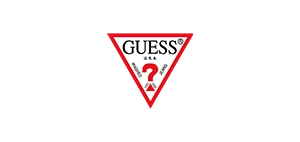



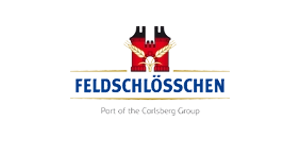

Saturday, March 1, 1986: Lugano is Swiss champion! A season to remember culminates with the most coveted prize: the delivery of the first Swiss playoffs cup to captain Kaufmann on the beautiful Davos rink. The hero of the evening and the entire championship is once again Kenta Johansson, with four goals in the decisive game that turn the score from 2-4 to 7-5! The Davos rink is tinged with bianconeri with more than 3,000 fans following the team. That evening marks the beginning of the Great Lugano era.
The 1986/1987 championship propels Lugano into Europe. Victorious first in East Berlin, the bianconeri eliminate what was considered the strongest Western team: Cologne. No Swiss team had ever reached the final stage of the European Cup. In the championship, Lugano repeats its success, winning its second national title in the playoffs against Kloten.
In the 1987/1988 season, despite Slettvoll having to rebuild the team, Lugano confirms its dominance in the championship. After dominating the regular season, they clinch their third consecutive title in the playoffs, again at Kloten's expense. The bianconeri win the final in three games, clinching the last match at the Resega with a goal by Vrabec in overtime under a delirious Curva Nord. A notable mention also goes to the European Cup held at an enthusiastic Resega. The honored guests included the legendary CSKA Moscow, then a world leader with legends like Larionov, Makarov, Krutov, and Fetisov, Färjestad, and Kosice. However, Lugano could do nothing against these giants of European hockey.
John Slettvoll and Geo Mantegazza's Lugano also secured first place in the 1988/1989 regular season. However, as spring approached, the Bernese bears, led by the phenomenal Renato Tosio, woke up from hibernation and snatched the title from Lugano. The endless challenge concluded after five battles at the Resega, under the incredulous eyes of the bianconeri fans. For the first time since the introduction of the playoffs, Lugano relinquished the national title to an opponent. The great disappointment led to the painful separation of the fans from their great idol: Kenta Johansson.
With Czech player Dusan Pasek suspended after a violent brawl against Ambrì, in the winter of 1990, Slettvoll and Senni decided to bring a small Japanese-Canadian named Steve Tsujiura to Lugano for the playoffs. This little great man would be the catalyst for the bianconeri's fourth national title, forming a formidable trio with Andy Ton and Jörg Eberle. In the final, Lugano avenged the previous season by winning in four games and clinching the title in the impressive Allmend rink, filled with bianconeri fans. Eberle and his teammates inscribed Lugano's name for the fourth time in the annals of Swiss hockey. This success effectively closed the Great Lugano era and with it the era of a beloved president: Geo Mantegazza. The Presidentissimo left the team in the hands of his trusted Fabio Gaggini.
The five-year period from 1990 to 1995 brought fewer joys to the bianconeri fans, with opponents increasing their investments in a now fully professional hockey world across Switzerland. The 1990-1991 season ended with a second-place finish in the regular season and a playoff final loss to Bern in four games. Nevertheless, Lugano spiced up the year with another participation in the final round of the European Cup in Düsseldorf, where they nearly pulled off an upset against the Finnish champions from Turku.
After the disappointing 1991-1992 season, the relationship between the club and the wizard Slettvoll entered a crisis. A troubled season ended with a second-place finish in the regular season and, right after the Olympic Games, a painful elimination in the quarterfinals of the playoffs at the hands of Zurich, led by a very young Arno Del Curto. For the first time in playoff history, Lugano did not make it to the final. The highlight of the season was Lugano's qualification for the final of the Spengler Cup, where they dominated Mannheim, beat Malmö in overtime, narrowly lost to Team Canada, and defeated the legendary CSKA Moscow in a shootout. The following day, in the final act, the Russian masters prevailed 5-2.
Parting ways with John Slettvoll, Lugano sought a new playing philosophy and style. For the 1992-1993 season, Canadian Andy Murray, a man of exquisite kindness, was hired to lead the team. Along with him came a legend, Igor Larionov, who had formed an unbeatable quintet for years in the Soviet national team and CSKA Moscow. On paper, Lugano was very strong, but they struggled to take off. Murray had difficulty adapting to the European mentality, and by December, the club was forced to part ways with him due to internal locker room issues, bringing back Slettvoll. Canadian star Brian Propp also joined to help, forming a dangerous duo with a finally healthy Larionov after a long bout with pubalgia. However, this was not enough to go beyond the playoff semifinals, where Lugano was eliminated in a shootout by Kloten at the Resega. Larionov left Lugano and returned to the NHL, where he would win the Stanley Cup two years in a row with the Detroit Red Wings.
The biggest novelty of the 1993-1994 season was the temporary rink called Reseghina. The old legendary Resega was being demolished to make way for a new and modern facility. Third in the regular season, Lugano was once again eliminated in the playoff semifinals by Kloten, led by Michael Johansson, Kenta's brother, and his compatriot Anders Eldebrink. John Slettvoll then changed roles and became sports director, with Finn Timo Lahtinen taking over as head coach. The 1994-1995 season saw Lugano finish second in the regular season behind Zug, but the playoffs betrayed the bianconeri, who were eliminated in the quarterfinals by the usual Kloten.
On September 25, 1995, the new Resega was inaugurated with the first championship game between Lugano and Lausanne. After the unforgettable celebration, however, hard times began, and in October, the club parted ways with Lahtinen due to a lack of results. John Slettvoll returned to the bench, but this time the move did not prove successful. Lugano finished the season in seventh place and was immediately eliminated by Kloten in the playoffs. The 1995-1996 season will also be remembered for the sad fate that befell defenseman Pat Schafhauser, who, on the evening of December 5, 1995, at the Davos rink, collided violently with the boards, suffering a spinal cord injury that left him in a wheelchair. Following this incident, the Pat Schafhauser Foundation was established at Lugano's initiative to create a fund for potential game-related injuries.
For the 1996-1997 season, new motivations were needed, and Lugano called upon an old acquaintance of bianconeri hockey: Mats Waltin, fresh from two seasons at the helm of Davos. Alongside him came another great Swede, Michael Nylander, who left the Calgary Flames (NHL) to wear the bianconeri jersey. The team grew, inspired by Nylander and bolstered by Russian Pavel Torgaev, finally defeating the Kloten bogeyman before being beaten in the playoff semifinals by Bern led by Gaetano Orlando.
The fans and the environment were hungry for victories. In addition to the promising Vauclair brothers, national player Patrick Fischer, Andy Näser, Canadian Todd Elik, a controversial figure on and off the ice, and multiple champion Swede Peter Andersson joined the team. However, the season started poorly, and in November, Waltin was replaced by Jim Koleff, who had come to Lugano as sports director. Jim brought the team back to the top positions in the standings but could not save the season, with the bianconeri being eliminated in the first round of the playoffs by Davos, once again in a shootout at the Resega. Great satisfaction, however, came for Julien Vauclair, who was drafted by the prestigious Ottawa Senators.
At the start of the 1998-1999 playoffs, the team's roster was complete and in great shape. Lugano struggled against Davos, then brilliantly eliminated the defending champions Zug with an almost unbeatable defense and goalkeeper and prepared to face Ambrì, who had a record-breaking regular season, in the final. Ticino was abuzz, and the derby atmosphere was everywhere. Thanks to greater freshness and experience, Lugano won its fifth national title on April 5, 1999, at the Valascia, surpassing their cousins in five games and winning all three matches in the valley! The protagonists of this splendid achievement were all the players, but a step above were definitely the goalkeeper Huet, defenseman and captain Andersson, and the indestructible Orlando, who, at 36, ended his stellar career.
The 1999-2000 season offered bianconeri fans memorable and spectacular evenings. Lugano dominated the regular season. The real achievement, however, came in the Euroleague, where, after defeating Dynamo Moscow 3-1 at the Resega and the Ice Tigers of Nuremberg in a shootout, they reached the Semifinal Round. Koleff's men won the home challenge against Slovan Bratislava and, in a thrilling match, also conquered the rink of the Slovak champions 6-5 in the return leg. The club's seriousness and professionalism brought the Top Four Final to Lugano, the final four round-robin tournament to crown the European champion team. In an enthusiastic Resega, with 24,000 spectators over four games, the Russians of Metallurg Magnitogorsk, captained by Gomoljako, won again, beating Sparta Prague in the final. The Czech champions had shattered the bianconeri's dream the night before in overtime. A fantastic game was decided by Czech Vujtek after Lugano had several times come close to scoring the winning goal.
The extraordinary European adventure, however, took a toll on the players' legs and minds. In the playoff final against the ZSC Lions, Lugano visibly faded and bowed out at the Hallenstadion in "game 6" when, with 10 seconds left on the clock, Plavsic scored the 4-3 goal, aided by a foul by Christian Weber on goalkeeper Huet.
The final of the 2000/01 season against Zurich was intense, controversial, and bitterly disappointing. With a 3-1 lead in the series, in 'game 5' at the Resega, Lugano failed to close the deal. Game 7 on April 7, 2001, was thrilling: Dubé scored, but Zeiter equalized in the 51st minute. The game went into overtime, where Samuelsson stunned Huet and broke the hearts of the bianconeri fans.
For the 2001/2002 season, former Great USSR player Zinetoula Biljaletdinov took over as coach of Lugano. The team had a strong start to the season but gradually lost momentum. Jim Koleff returned to the bench, but the playoffs did not bring much satisfaction.
During the 2002/2003 season, the management also parted ways with Koleff, abruptly ending an era. Larry "Harry Potter" Huras took over as coach, instilling confidence game by game. In the final, they faced Arno Del Curto's reigning champion Davos. The first two games were won by the Grisons, but Lugano did not give up, showing incredible grit and winning the remaining four games. This remarkable achievement was led by the team as a whole, especially goalkeeper Rüeger, the brilliant Nummelin, and the inspired Rötheli. Game 6 was dominated by Captain Fuchs and his teammates in front of a packed Resega, with a commanding 4-0 victory stemming from an excellent collective performance. This title will be remembered by all Lugano fans as the last one won by the great Bertaggia. Sandro, an indomitable fighter, decided to retire, hanging up his skates after a fantastic career spanning 18 seasons with over 800 LNA appearances and 6 Swiss championships with Lugano! His number 2 jersey will never be worn by another bianconero.
From the summer of 2003, a Finnish hockey icon donned the bianconeri jersey: Ville Peltonen, already a world champion with a hat-trick in the final. The bianconeri finished the 2003/2004 regular season ahead of Bern with a record number of points: 74 points in 48 games! The championship was decided in the fifth and final game in front of a sold-out Resega. Maneluk equalized with 32 seconds left with a lightning strike, sending the game into overtime. However, Bern deservedly won at 14:20 of overtime with a goal by Marc Weber.
The 2004/2005 season will be remembered as one of the most interesting in Swiss hockey history. The NHL lockout enriched our league with world stars such as Thornton, Nash, Hagman, Brière, and St. Louis. HCL's winter was marked by a long string of injuries. Despite this, Lugano remained at the top. Several NHL players passed through Resega, including Kimmo Timonen, Jason Blake, and especially Alex Tanguay, a 24-year-old Quebecois with crystal-clear talent but very unlucky, first with a recurring old hip injury and then, upon returning after two months, with a knee ligament strain. For the second consecutive year, Bern proved to be an insurmountable obstacle with effective defensive play and greater decisiveness in key moments. A veil of sadness fell as JJ Aeschlimann, after 14 seasons in bianconero, left the club to end his competitive career at age 38 in Lausanne.
Glen Metropolit, a Canadian with flair and reliability, illuminated the 2005/06 regular season, becoming the top scorer. But when the crucial games began, following the intense emotions of the 2006 Turin Olympics, where seven bianconeri contributed to Finland's silver medal alongside Nummelin, Peltonen, and Hentunen, and the exploits of the Swiss against Canada and the Czech Republic, nerves and a lack of incisiveness emerged. An Ambrì team that fully exploited its resources pushed Lugano to the brink. The club's management reacted by dismissing Huras. The fans were furious, with some resorting to verbal aggression, while others, thankfully with unwavering faith, flooded the players with messages of encouragement: nothing is impossible! The new leaders, Harold Kreis (a German hockey icon, head coach at the partner team Coira) and Ivano Zanatta (already assistant coach), redistributed responsibilities and demanded the three Cs: brain, heart, and guts. Vauclair's fluky goal at Valascia was a sign of destiny. The locker room became rock solid, impervious to any destabilizing attempts. And the feat of coming back from 0-3 in the series, never before achieved by anyone in Europe, materialized on March 19, 2006. The anguish of losing to the cousins vanished, and now the fun began. On this momentum, Lugano steamrolled Kloten and challenged the reigning champion, Davos. There was no contest. Lugano nearly perfected their athletic and aesthetic form, traveling like a speeding train that overwhelmed everything and everyone. Each player sublimated their qualities. The heroes were not individuals, like the sprite Nummelin, the bomber Hentunen, the terminator Gardner, the gladiator Sannitz, the devil Metropolit, or captain Peltonen. The team triumphed, their unity of purpose forged in adversity. And when the final siren at the Resega on April 13, 2006, signaled the victory in 'game 5', the bianconeri fans were on cloud nine. It was the most genuine, visceral joy, one that can only be felt after much suffering, the pleasure born of struggle, as Leopardi wrote. It was also the pride of a team that had taught Ticino and Switzerland what it truly means to honor the Hockey Club Lugano jersey.
After reaching the pinnacle, the club and fans faced very difficult months. The NHL quickly came knocking for Metropolit, Nummelin, Peltonen, and York. A severe blow on the sporting front. A judicial inquiry shook the foundations of HCL's management. This 'tsunami' culminated in the reshuffling of the general shareholders' meeting on November 29, 2006, and the election of Paolo Rossi as the new President. In January 2007, the bianconeri family had an unforgettable international experience. Over two hundred fans followed HCL to St. Petersburg for the Super Six with national champions from the six strongest European countries. Lugano deservedly finished on the podium, beating Färjestad 3-0 before bowing out to Ak Bars Kazan by the same score.
In the 2006/07 playoffs, the quarterfinal opponent was Kloten, with Eldebrink and Hollenstein on the bench. 'Game 6' sealed their elimination. The coup de grâce, unfortunately, came with a glaring referee error by Prugger, who blew the whistle with the puck still in motion, just as Jeannin was scoring to tie it 2-2 with 32 seconds left. An ending that left a bitter taste in a season that was nonetheless constructive for the future.
On October 18, 2007, top scorer Jukka Hentunen left Lugano for an unmissable lucrative contract in Russia with Ak Bars Kazan. In mid-November, management and fans believed they had found a solution. Former NHL star Anson Carter (674 games, 421 points), known for scoring the phantom goal that gave Canada the 2003 World Championship, landed in Agno and made a bang, scoring three goals in three games and immediately endearing himself with his attitude towards hockey and life. However, due to repeated injuries, delayed physical condition, and doubts about his true motivation, Carter soon disappeared from the scene. The club invested the proceeds from Hentunen's transfer to bring in David Aebischer, the first Swiss to break into the NHL (214 appearances), a Stanley Cup winner and a highly talented goaltender, though marginalized in North America. Between November and December, Lugano entered a deep crisis. The inability to react to negative episodes cost Ivano Zanatta his job. To shake things up, Kent Ruhnke, known for his reputation as a tough sergeant, was called in. The move, however, did not produce the desired effects. Ruhnke failed to connect with the players. With the playoff line increasingly out of reach, on January 9, 2008, the sensational return of John Slettvoll was announced. To save a nearly irreparably compromised season, the club played on emotions, relying on the charisma of a figure who embodied HCL's glorious history. But the playoff chase remained unfinished, and for the first time in twenty-two years, Lugano found itself in the playouts, which, as expected, turned into a nightmare. The fear of losing to a weaker team like Basel and a series of injuries turned five games into pure suffering. In the end, Lugano succeeded, thanks also to a crucial goal by young Chiesa in the Rhine region and Landon Wilson's renewed scoring form.
The big news of summer 2008 was Petteri Nummelin's return after two seasons in the NHL. The Finnish star hadn't lost any of his talent: his brilliance was a sight to behold. Individually, in the 2008/09 season, the standout was the 24-year-old Norwegian Patrick Thoresen, a true powerhouse. The drama of having five foreign players gradually ruined the locker room and the environment. Slettvoll couldn't manage it properly, discontent grew, and the media reveled in it. These were the first signs of weakness from the man from Umea, who couldn't stomach the club's decision not to continue with him around Christmas. Slettvoll's ego prevailed over the team's well-being, and on January 7, 2009, on the eve of a derby, the wizard abandoned everything and everyone, accusing HCL and all its components of lèse-majesté. The quarterfinal pairing was Davos-Lugano. A spectacular series, with endless emotions, frenetic-paced games, and the bianconeri fans' enthusiasm reignited. With a goal by the selfless Conne in overtime, Lugano stayed alive on the brink, won game 6 at the Resega in a shootout, and headed to the Vaillant Arena for the decider. A true disaster (7-1) that left a lasting mark on the fans' collective imagination and tainted the good work done over the months.
In the summer of 2009, the club presidency changed again. After Paolo Rossi announced he would not seek re-election for personal and professional reasons, the Search Committee identified Silvio Laurenti as the new president. The second big change was Kent Johansson taking over as head coach, assisted by Sandro Bertaggia. One of the most respected coaches in his country, where he also won a title with HV 71, Kenta was tasked with building a medium-term project. In mid-November, a real turning point occurred in the technical department. Roland Habisreutinger was appointed as sports director, a man with personality and character, fresh from a playoff final with the Kloten Flyers. Jörg Eberle took on a new challenge within the organization as head of training. Between January 10 and 23, Näser and his teammates entered a black hole. The club realized that Kent Johansson was not the right fit for the particular environment of Swiss hockey. His reserved and introverted nature made it difficult to communicate with the players and the club, resulting in a disoriented group. To provide the classic emotional jolt and avoid the playouts, the club decided to change leadership mid-season, turning to the unforgettable gladiator Philippe Bozon in his first professional coaching role. Bozon led the team to the postseason, where Bern would be the end of the road.
On April 6, 2010, the bianconeri family mourned a tragedy. The body of Tiziano Muzio, the athletic trainer, was found under an avalanche on his beloved Monte Bar. A special man who had been part of the club's life for thirty years, he earned everyone's respect and admiration for his competence, but even more for his sensitivity and generosity. His name will forever evoke values like sacrifice and passion for one's work in Lugano.
The 2010/2011 season marked the 70th anniversary of the founding of Hockey Club Lugano. With the playoff line out of reach, on November 29, 2010, Philippe Bozon and Sandro Bertaggia were relieved of their duties. In their place, the club trusted two men from within: Mike McNamara and Patrick Fischer, until then the brilliant head coach and assistant coach of the Junior Elite. Some successes raised hopes of climbing the standings, but Lugano was practically out of the playoffs by Christmas! Three days before the start of the playouts, the club decided to bring in a new face to lead the technical staff. McNamara and Fischer remained as assistants, and 46-year-old Canadian Greg Ireland, with significant AHL experience, took over as head coach. The move proved successful as Lugano swiftly dealt with the feared playouts, securing four well-deserved consecutive victories against the Lakers.
On June 22, 2011, the shareholders' meeting elected Vicky Mantegazza, daughter of the Presidentissimo Geo, as the new President in the Lugano City Council chamber. Raised with the bianconeri DNA and the architect of the Ladies Team's successes, she took over. Barry Smith, a 60-year-old American coach with extensive NHL experience, was appointed to lead a vastly renewed team. However, Smith struggled from the start to familiarize himself with the dynamics of Swiss hockey, and on October 21, 2011, after a humiliating 9-1 defeat at Kloten, he unexpectedly returned to North America, not without criticizing the players and the club. Coincidentally, the same evening, Bern fired Larry Huras for not offering a sufficiently lively game. After an interlude of two games by the Fischer/McNamara duo, Larry the demanding returned to Lugano, bringing his typical energy, daily dedication, and attention to detail. Under his guidance, the team gradually found its identity. Highlights of an inconsistent regular season, but comfortably closed in sixth place, were certainly the six derby wins against Ambrì: a record. However, the playoffs against Fribourg brought back the real emotions for the fans. Huras's men achieved the feat of conquering the BCF Arena with two tactically and athletically perfect performances. However, they couldn't repeat this at the Resega, where they bowed three times. Thus, the Burgundians advanced to the quarterfinals with an overall score of 4-2. For the club, staff, and players, the satisfaction was in exiting with heads held high, with warm applause from the Resega. Sébastien Reuille, heroic and stoic as the team's top scorer in the playoffs after enduring 80 stitches in his palate, embodied the renewed gladiatorial spirit of Lugano.
The 2012/2013 championship will be recorded in bold letters in the history of Swiss hockey. The legendary NHL was stuck in a lockout until mid-January. On Swiss ice, fans could admire stars like Zetterberg, Tavares, Kane, Seguin, Spezza, as well as prodigal sons Streit, Diaz, Weber, etc. In this race for stars, Lugano fared well. The defense was bolstered by young Luca Sbisa from Anaheim, and more importantly, the attack celebrated the all-around class of Patrice Bergeron, a key player for the Boston Bruins and a genuinely delightful person. In 21 games with the bianconeri, Bergeron scored 11 goals and 18 assists, worked tirelessly, and taught hockey to his teammates. Vauclair and his team finished the regular season in sixth place and faced Zug in the playoff quarterfinals with optimism. In a tight seven-game series, Doug Shedden's team advanced. The club's thorough technical analysis left no room for Larry Huras, who was replaced for the new season by his assistant Patrick Fischer (new head coach) and Peter Andersson (new assistant coach).
On August 31, 2013, after a friendly match at the Resega against TPS Turku, HCL retired Petteri Nummelin's no. 33 jersey in gratitude for his contributions during two extraordinary five-year periods of flair, creativity, and spectacle. A few days later, the 2013/14 season began. Patrick Fischer and Peter Andersson's Lugano quickly made it clear they had a clear vision. With courage and support from the club, the two coaches initiated what was called the 'Fischerrevolution.' Over the months, the club parted ways with several players. The goal was to build a fast team capable of playing with intensity while also reducing the budget. The real acquisition was the Swedish world champion Fredrik Pettersson. Talented, tireless, and a true leader, Pettersson quickly became the team's added value. Finishing fifth in the regular season, the bianconeri faced McSorley's tough Geneva in the playoffs. The games were tight, but the physical superiority of the Grenats prevailed with a 4-1 series win. There were many positives to note at the end of the season, including the 22 games played by 19-year-old Latvian-Swiss goalkeeper Elvis Merzlikins. Agile and possessing a strong personality, Elvis was drafted in the summer by the Columbus Blue Jackets and won the Swiss Ice Hockey Award for the best rookie of the season.
The big market move of spring 2014 was Linus Klasen. With talent and flair like few others in Europe, the swift winger enchanted the Swiss championship, inspiring especially his 'different twin' Fredrik Pettersson. The Swedish duo occupied the top two spots in the regular season's scoring chart, with 69 and 55 points, respectively. But Lugano's name would be on the lips of the entire hockey world in mid-December when the club announced the arrival of Damien Brunner at the Resega with a four-year contract, after his decision to end his NHL adventure (Detroit Red Wings, New Jersey Devils). For his on-ice accelerations and quick execution, the MVP and top scorer of the 2011/2012 season with Zug was considered by experts as the most spectacular Swiss forward in circulation. The regular season was extremely positive, with a third-place finish, the best ranking since 2006, over 4,000 season ticket holders, and an average attendance of 5,559 spectators. This attested to the growing passion for an HCL that was finally stable at all levels. Unfortunately, the playoffs offered little satisfaction. The Geneva nightmare materialized for the second consecutive year.
In late October 2015, with the team at the bottom of the standings, the era of Patrick Fischer and Peter Andersson also came to an end. After the interlude of Christian Wohlwend, the new strongman on the bench became the charismatic Canadian Doug Shedden, assisted by the loyal Italo-Canadian Pat Curcio. Perhaps for a group that had become so vulnerable, the presence of a head coach with gray hair was just what was needed. In a relatively short time, Hirschi and his teammates reacted vigorously, climbed the standings, and most importantly, rediscovered their identity. The positive experience of the Spengler Cup, with a narrow final loss to Team Canada, strengthened the group, which entered the playoffs highly charged and bolstered by the addition of Canadian forward Maxim Lapierre, who played the role of provocateur. His destabilizing trash talk became one of the winning elements of a splendid run to the final after overcoming Zug and Geneva. Players and the club shrugged off a heavy burden. Everyone performed their role to perfection, starting with Elvis Merzlikins, imperial between the posts, followed by an almost impenetrable defense and various offensive solutions (Klasen, Martensson, and Brunner, among others) capable of scoring crucial goals. What entered the annals was Furrer's penalty in overtime against McSorley's men, propelling the bianconeri to the final. Lugano faced a historic rival for the title: Bern. The Bears had barely made the playoffs but had forcefully eliminated Zurich and Davos. The series was intense every night, but in the end, Martin Plüss and his team, fresher and sharper, prevailed, aided by some scandalous referee decisions. The dream flew away in a sky of applause. The disappointment was great, but the embrace of a very sporting audience is an image to be cherished in the archives.
Expectations for the 2016/2017 season were high, confirmed by a new record of season tickets at the Resega (4,748). Compounded by commitments in August and September for the not very lucrative Champions Hockey League, Chiesa (the new captain) and his teammates experienced a difficult autumn. The good run at the Spengler Cup, culminating in another final loss to Team Canada, was not enough this time to regroup the team, and in mid-January, the club dismissed Shedden and Curcio, bringing back Greg Ireland, the man who had saved them in the 2011 playouts. The new technical staff quickly stimulated every player, redistributing tasks and responsibilities. Lugano entered the playoffs from seventh place but with renewed spirit. Attitude and willingness to sacrifice were the winning weapons to eliminate the favored ZSC Lions, a team rich in talent, in six games in the quarterfinals. The series was thrilling, also featuring off-ice drama like the recusal of the National League's substitute sole judge. Riding this momentum, the bianconeri conquered Bern in game 1 of the semifinals. However, the strength of the Swiss champions, who would go on to retain their title, was impressive, and Jalonen's men won the next four challenges, the last one ending in a shootout at the Postfinance Arena. For HCL, it was a season of highs and lows but very intense. From the frustration of autumn, they transitioned to the joys and overwhelming enthusiasm of March.
Under the leadership of Greg Ireland, who proved to be a coach capable of motivating and involving every player in his team project, Lugano had a steady 2017/2018 regular season, finishing in fourth place, always near the top of the standings. It was a serene season in good harmony with the fans, also marked by the offensive explosion of Gregory Hofmann and Luca Fazzini, the latter becoming the Top Scorer of the Regular season. The new Finnish center, Jani Lajunen, met expectations, and his physical and essential play significantly contributed to the team's consistency, along with Maxim Lapierre, the true leader of the group. In the penultimate game of the regular season, something incredible happened. Captain Chiesa, Dario Bürgler, and Damien Brunner were victims of three serious injuries in Davos that ruled them out of the crucial games. This situation further strengthened the spirit of sacrifice. The bianconeri first defeated the ambitious Fribourg 4-1 in the quarterfinals. In the semifinals, Lugano also overcame Bienne after coming back from 0-2 in the series and 0-3 in game 3, when Reuille's shorthanded goal sounded the charge. The final against the ZSC Lions was thrilling. The stratospheric saves of Merzlikins, the heart and passion displayed by a group of men who bent but never broke, exalted the bianconeri fans, and the Resega became a real cauldron with five consecutive sold-outs. It went to game 7, decided by Geering's lone goal. The bitterness was great, but after a few days, pride prevailed for a team that had fielded ten players under 25, all trained in the Club's Sezione Giovanile!
Thanks to the new Arena Partner, the Cornèr Banca Group, the Resega was renamed Cornèr Arena. Despite criticism, the club went against the tide, held firm, and confirmed their trust in the technical staff until the end of the season. Clinging to Hofmann's scoring prowess and in a context of great balance in the standings, Chiesa and his teammates secured a playoff spot in the final rush. Against Zug in the quarterfinals, an emotional jolt was expected, but it was not sufficient. Lugano was out in four games. The curtain fell prematurely on the 2018/19 season, and the only resounding applause was for Elvis Merzlikins, on his way to the Columbus Blue Jackets and the NHL stage, and for the final moments on the ice of the warrior Sébastien Reuille.
The 2019/20 season will certainly not be remembered for the hockey played. The club changed its organizational structure and appointed Marco Werder as CEO. The era of Sports Director Roland Habisreutinger also came to an end, with Hnat Domenichelli taking over the role. However, in late February 2020, the entire world became acquainted with the word COVID-19. A virus, a pandemic that claimed lives and upended everyone's lives.
By mid-March 2020, any public events were canceled. The National League had no choice but to cancel the imminent playoffs, which Lugano had just barely qualified for. What happened in the previous months lost its significance, including the brief stint of Sami Kapanen with the bianconeri family.
The Finnish head coach had been relieved of his duties just before Christmas, replaced by the seasoned Serge Pelletier. The 2020/21 season was also heavily affected by the pandemic. For many months, clubs were required to play matches behind closed doors. This situation, at times absurd, generated financial consequences never imagined. The political sphere debated the importance of professional teams for the entire sports movement, and thus, thanks to loans and non-repayable grants from the Confederation, bankruptcies and disappearances were avoided.
On a strictly technical level, Pelletier's Lugano achieved the best regular season result in recent years, securing second place based on defensive solidity and offensive inspiration from players like Heed, Arcobello, and Fazzini. However, the playoffs brought a cold shower. Rapperswil extinguished all enthusiasm, winning the series 4-1.
The 2021/22 season saw a profoundly renewed and ambitious Lugano at the starting line. The bench became the home of Chris McSorley, the volcanic leader of Servette for nearly two decades. The roster was enriched with players like defensemen Santeri Alatalo and Mirco Müller and forward Daniel Carr. The performance was inconsistent. The team scored a lot but conceded too much.
They qualified for the playoffs through the grinder of the pre-playoffs, facing the Geneva Grenats. However, the superiority of Tangnes' Zug in the quarterfinals was evident. The summer 2022 signings were once again Finnish. Arriving on the shores of Lake Ceresio were goaltender Mikko Koskinen and forward Markus Granlund, players with palmarès and experience.
However, trust between McSorley and the locker room wavered at the first hurdles, and in early October, the club made the most drastic and courageous decision in its modern history. The farewell to CMS without too many regrets and the technical leadership entrusted to Luca Gianinazzi, a coach not yet thirty years old, trained in-house, and protagonist behind the bench of the recent exploits of the U20-Elit. The entire Swiss hockey community was taken aback and amazed by the turn of events but soon learned to appreciate the competence and personality of "Giana," who quickly gained credibility inside and outside the Cornèr Arena.
The battle to access the postseason was fierce. The pre-playoff stage once again brought satisfaction with the double confrontation against the favored Fribourg. The subsequent playoff quarterfinal was tense and exciting. Geneva, the future Swiss champion and future Champions Hockey League winner, made the psychologically decisive step, winning "game 5" at Vernets in the third overtime. But the path to a new Lugano was set.
And the course was strengthened with the progress of the 2023/24 season. Gianinazzi's Lugano navigated serenely in mid-table, despite the team suffering a string of injuries (Marco Müller, Granlund, Schlegel, Carr, Morini, Walker), which forced the sports management to bring in new players. The seventh place in the regular season opened the doors to a historic home-and-away derby in the play-in, which Thürkauf and his teammates won, especially thanks to the comeback from 0-4 to 4-4 at the Gottardo Arena. The quarterfinal against a Fribourg openly aiming for the title finally presented a tenacious Lugano up to the last second of "game 7" lost in Burgundy territory.
The 2024/25 season will unfortunately go down as the most disappointing and troubled in the last two decades for HCL. Results didn’t come, and the team's performances on the ice worsened throughout the autumn. Until Christmas, the club management stood firmly behind a coaching philosophy that marked a break from the past. However, the standings told a different story and, with Lugano sitting second-to-last in early January, the homegrown coach-led project had to be abandoned. As interim solution, experienced and charismatic German coach Uwe Krupp arrived at the Cornèr Arena. Despite a few glimmers of hope, the team failed to change gears, and for the first time since the 2010/11 season, Lugano missed the minimum goal of reaching the playoffs. The dreaded playouts became reality, with Ajoie as the opponent. The team from Jura won the first two matches and came close to winning the third. In the final seconds of Game 3, momentum fortunately shifted in Lugano's favour, thanks to the determination of Giovanni Morini, who had returned after a long absence due to a serious injury. Lugano turned the score around and gained the push to take control of the series. Players, staff and fans breathed a deep sigh of relief after a season marked by technical management errors, which also led to the departure of General Manager Hnat Domenichelli after five years.
In Loreto, the first real matches took place with exhibitions from prestigious teams such as the Oxford University team. On February 1, 1950, in front of 2,500 people, a historic match was played: the Canadians from the Edmonton area, the Waterloo Mercurys, faced off against the Diavoli of Milan. A few weeks later, in London, those Canadians became world champions with the maple leaf. However, the lack of political support from city authorities led to eviction from Loreto as well. In 1955, after many hardships, Lugano played some matches on what was a tennis court in the summer at the Münger pastry shop in Paradiso, thanks to Cuccio Viglezio and Guido Keller, great supporters of the bianconeri family. Also in 1955, a garage owner from Noranco named Albino Mangili set up the Noranco facility, where the first real signing in bianconeri history, Beat Rüedi from Graubünden, who had already played for the Swiss national team and won multiple Swiss championships with Davos, arrived. Rüedi skillfully moved across the field to realize what was considered a true dream in Lugano: an artificial ice rink.
In 1956, Lugano celebrated its first promotion to the first division. On December 1, 1957, thanks to the initiative of Engineer Pino Pedrolini, the first artificial rink was finally inaugurated north of Cornaredo under the luxurious Castello di Trevano. This rink was named Resega, as there used to be a sawmill in that area. The Resega was inaugurated with great pomp in the presence of 6,500 spectators with a friendly match between Switzerland and Italy. Among those present that day was Geo Mantegazza, who thirty years later would lead Lugano to the top of Swiss and international hockey. A professional engineer, it was by doing the static calculations for the Resega that he first came into contact with the bianconeri family.
Lugano spent nine years in the second division, with fluctuating results, although several players in the seventies ignited the Resega, such as the Finns Juha Pekka Rantasila and Henry Leppä and the American Tom Vanelli. In 1975, the bianconeri packed their bags and moved to the first covered rink in Lugano: the one in Mezzovico. The bianconeri played there for two seasons before the Palasport in Mezzovico collapsed on the morning of February 12, 1978, due to an exceptional snowfall. This event marked the club's return to the Resega, now permanently covered.
In 1978, a person who would become a significant figure in the history of Lugano and Swiss hockey entered the scene: Geo Mantegazza. Along with him came what would often be the seventh player on the ice: the Curva Nord! The new management team, consisting of Geo Mantegazza, Severo Antonini, and Fausto Senni, immediately achieved two historic results: for the first time, Lugano ranked ahead of Ambrì, and for the first time, on October 23, 1979, Valascia was conquered (5-2).
In the first season in Serie A, besides the spectacular Canadian defenseman Bob Hess, Lugano welcomed the prolific forward Giovanni Conte and the great promise of Swiss hockey, the Appenzeller Jörg Eberle. In the summer of 1983, to shake things up, President Mantegazza initiated a real technical revolution by bringing in a new coach from Sweden: John Slettvoll. Alongside him, strict on and off the ice, came a player destined to become a fan favorite at the Resega: the legendary Kent Johansson! The agile number 25 had some initial adjustment problems but started to shine after Christmas!
Enthusiasm for hockey in Lugano grew, and other important players completed an increasingly competitive roster, such as national players Beat Kaufmann and Arnold Lörtscher. To tackle the 1984/85 season, Slettvoll's Lugano further strengthened with two crucial additions: Mats Waltin and Fredy Lüthi. Waltin was a true pillar of the Swedish national team and, along with Ingemar Stenmark and Björn Borg, a Swedish sports legend. The mighty bianconeri chased the champions of Davos throughout the season but could not wrest the title from the Grisons, nevertheless concluding the best season in their history up to that point with a second-place finish
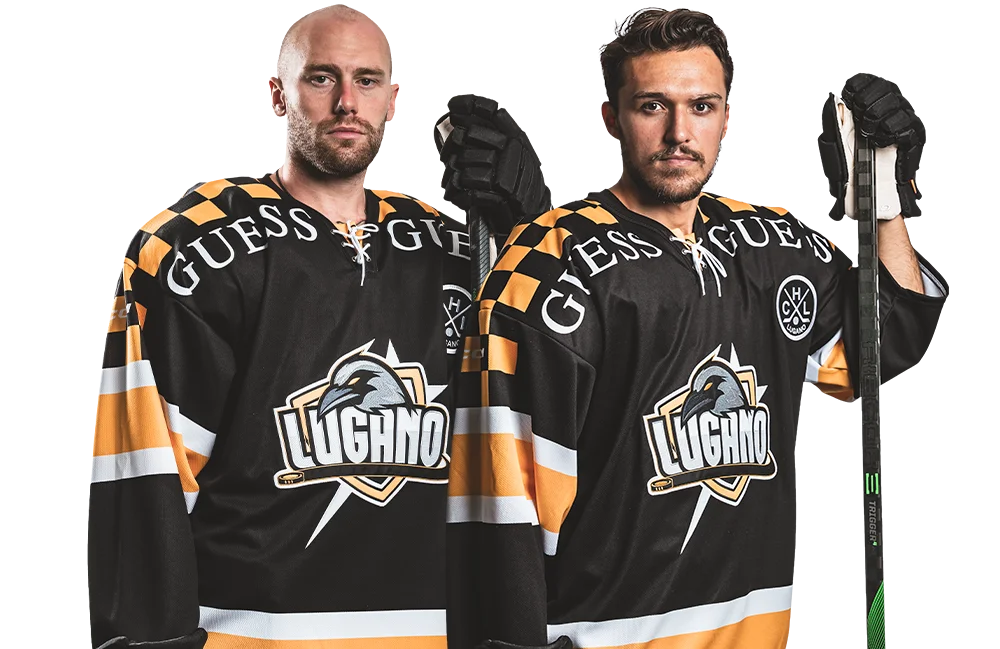
Subscribe to the official Hockey Club Lugano Newsletter to stay updated on the latest news from the Bianconeri world!

Hockey Club Lugano SA
Via Maraini 15a
6963 Pregassona
We use cookies and other tracking technologies to improve your experience and to analyze our website traffic.
For more information, please refer to our Privacy Policy.
By clicking "Accept," you consent to the collection of data.
You can change your cookie settings at any time and reject them, except for strictly necessary functional cookies.
